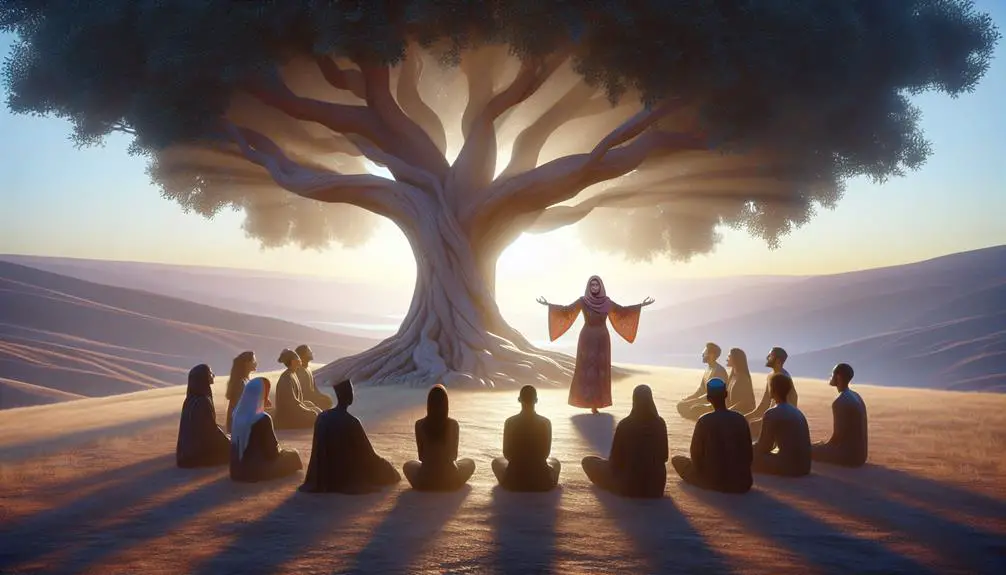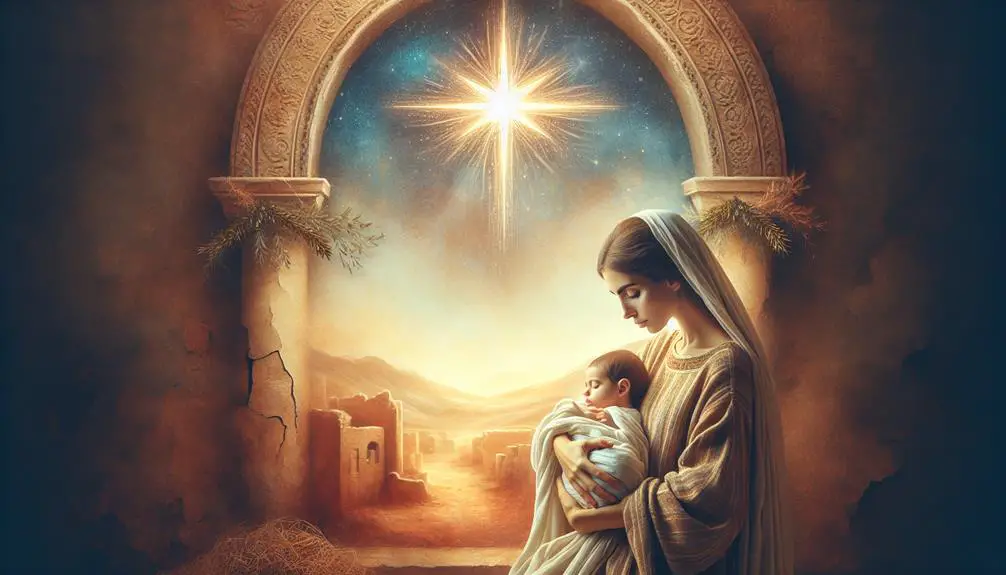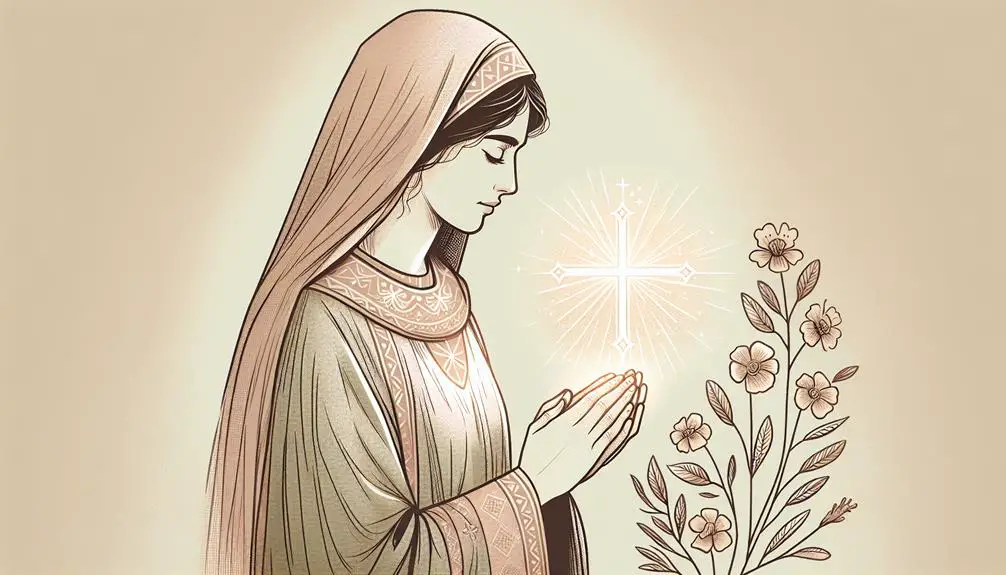Dive into the untold stories of biblical women, exploring their profound impact on faith and gender roles, leaving you questioning modern interpretations.

Sermon on Women's in the Bible
The discourse on women's roles within the biblical narrative offers a rich tapestry of complexity, virtue, and leadership that has shaped theological perspectives across the ages. From Eve's pivotal role in the Genesis, through the steadfast faith of Sarah, to the strategic bravery of Esther and the influential leadership of Deborah, each narrative provides a unique lens through which to examine the interplay of divinity and femininity.
As we embark on this exploration of women in the Bible, one must ponder the implications of these stories on contemporary understandings of gender roles within faith communities. What lessons can we glean from these ancient texts that resonate with today's societal constructs?
Key Takeaways
- Women in the Bible embody courage, leadership, and unwavering faith, setting examples for all believers.
- Their stories highlight the complexities of womanhood and faith within various societal and patriarchal challenges.
- Through actions and virtues, biblical women teach enduring lessons on loyalty, bravery, and spiritual wisdom.
- They serve as inspirational figures, demonstrating how faith guides and strengthens individuals in facing life's trials and decisions.
Eve: The Genesis of Womanhood

Eve, as depicted in the Book of Genesis, embodies the foundational aspects of womanhood, setting a precedent for female representation in biblical narratives. Her emergence from Adam, rather than being a mere afterthought, signifies a deliberate act of female creation, imbuing her with inherent value and purpose within the divine schema. This act of creation, while often subjected to interpretations that sideline her role, can alternatively be viewed through a lens of empowerment and equality. Eve's narrative is not just the story of the first woman but also a symbol of the complexities and potentialities inherent in womanhood.
The portrayal of Eve as both participant and catalyst in the pivotal moment of human consciousness—through the acquisition of knowledge—further cements her role as an empowerment symbol. This act, traditionally seen as transgression, can also be interpreted as the pursuit of wisdom, agency, and autonomy. It underscores a vital aspect of her legacy: the quest for understanding and growth, even at great personal cost. Eve's journey from creation to the consequences of her actions highlights the dual nature of her legacy—as the progenitor of human life and as a figure symbolizing the pursuit of knowledge and self-determination.
In analyzing Eve's story, it becomes evident that her narrative serves as a multifaceted representation of female creation and empowerment. Through her, the Genesis narrative articulates themes of origin, identity, and the nuanced complexities of womanhood. Eve stands as a testament to the strength, resilience, and agency of women, setting the stage for subsequent female figures in biblical stories to navigate their paths within the tapestry of sacred history.
Sarah's Journey of Faith

Sarah's journey of faith, as depicted in the biblical narrative, encapsulates a profound transformation from skepticism to conviction, marking her as a pivotal figure in the foundation of a nation.
Her initial doubt, faced upon hearing the promise of bearing a child at an advanced age, underscores the human struggle with faith in the face of seemingly impossible circumstances.
This transition to unwavering trust, culminating in the birth of Isaac, exemplifies the dynamic nature of faith, influenced by divine promises and personal growth.
Sarah's Initial Doubt
Doubt, a common human experience, was not absent in the journey of faith undertaken by Sarah, as initially, she questioned the promise of bearing a son in her advanced age. This skepticism is emblematic of human nature's struggle to reconcile divine promises with earthly reality.
Sarah's laugh, often interpreted as disbelief, symbolizes a broader theme of divine laughter in the face of impossibility. Her initial doubt did not signify a lack of faith; rather, it highlighted her humanity.
Through her story, the notion of barren blessings emerges, suggesting that moments of doubt can lead to profound gifts. This narrative invites reflection on the complexity of faith, where divine promises often unfold in unexpected ways, challenging and ultimately strengthening belief.
Promise of a Nation
Transitioning from a period of skepticism, the narrative arc of Sarah's experience shifts towards the fulfillment of a divine promise that would not only transform her personal destiny but also lay the foundational stone for the emergence of a nation. This moment marks a critical juncture in the biblical account, intertwining female lineage and patriarchal challenges within the fabric of faith's journey. Sarah's story, thus, becomes emblematic of the broader theme of perseverance and divine orchestration in the face of doubt.
Aspect |
Significance |
|---|---|
Divine Promise |
Assurance of progeny and nation-building |
Female Lineage |
Central role in the unfolding divine plan |
Patriarchal Challenges |
Navigating societal norms within the faith context |
Faith's Journey |
Transition from skepticism to trust |
Emergence of a Nation |
Foundation for a multitude of generations |
Her experience encapsulates the complexity and eventual triumph of faith, setting a precedent for the narratives that follow.
Transition to Trust
As the narrative unfolds, the skepticism that once clouded Sarah's faith begins to dissipate, marking the onset of her journey towards unwavering trust in the divine promise. This transition to trust is pivotal, illustrating profound faith transitions in the face of uncertainty.
- Initial Doubt: Sarah's initial laughter at the promise reflects her doubt, a natural human reaction to the seemingly impossible.
- Divine Reassurance: The subsequent divine reassurance serves as a cornerstone for trust building, highlighting the patience and faithfulness of the divine.
- Personal Transformation: Sarah's transformation from skepticism to faith mirrors the journey many believers undergo, emphasizing the importance of patience and divine timing.
- Fulfillment of Promise: The eventual fulfillment of the promise cements Sarah's trust, demonstrating the reliability of divine promises and the power of unwavering faith.
The Bravery of Esther

Transitioning from the inspiring narrative of Sarah's journey of faith, we now turn our focus to another remarkable figure in the Biblical canon: Esther.
Her story exemplifies unparalleled bravery through her courageous stand, her confrontation with the royal decree, and her instrumental role in the salvation of her people.
This examination aims to elucidate the multifaceted dimensions of Esther's valor and its enduring impact on faith and leadership.
Esther's Courageous Stand
Esther's courageous stand in the face of mortal danger presents a compelling example of faith and bravery in the biblical narrative. Navigating through the intricacies of Persian politics and a beauty contest that positioned her as queen, Esther's story is not just about her beauty but her strategic and bold decision-making. Her actions highlight:
- Understanding of Persian politics to navigate her role.
- Courage to leverage her position gained through a beauty contest.
- Wisdom in timing her actions for maximum impact.
- Faith that guided her to risk everything for her people.
Her story is a testament to the power of courage and faith, transcending mere survival to effecting change within a formidable empire. Esther's narrative teaches valuable lessons on bravery, strategy, and the profound impact of individual actions within larger societal frameworks.
Royal Decree Challenge
Facing the imminent danger posed by a royal decree, Esther demonstrated unparalleled bravery by choosing to intervene on behalf of her people, despite the potential personal cost. This scenario unfolded within the complex web of Persian politics, where the king's word was law and dissent was not tolerated.
Esther's decision to step forward is even more remarkable when considering the backdrop of Vashti's defiance, which had previously set a precedent for the perilous consequences of challenging royal authority. Yet, Esther navigated this treacherous political landscape with wisdom and courage.
Her actions were not just a personal risk but a strategic maneuver within the confines of Persian court politics, showcasing her deep commitment to her people and her exceptional bravery.
Saving Her People
In an act of unparalleled bravery, Esther chose to risk her own life to save her people from impending genocide, thereby embodying the epitome of selfless leadership within the treacherous confines of the Persian court. Her story is a profound testament to women's empowerment and the significant cultural influence of female figures in religious texts.
Key aspects of Esther's bravery include:
- Courageous Approach: Facing the possibility of death for approaching the king unbidden.
- Strategic Planning: Organizing banquets to win the king's favor and expose Haman's plot.
- Advocacy: Boldly advocating for her people's safety, despite personal risk.
- Legacy: Her actions not only saved her people but also established her as a timeless symbol of courage and influence in the face of adversity.
Deborah's Leadership

Deborah's leadership, marked by wisdom and courage, stands as a pivotal example of female authority in the Bible. As both a prophetess and a judge, her unique role in Israel's history encapsulates the profound impact of women in religious narratives. Unlike many of her contemporaries, Deborah's leadership extended beyond judicial decisions to military strategy, illustrating her multifaceted role within her society. Her direction in battle tactics against Canaanite forces, as well as her execution of a judge's role in settling disputes and maintaining social order, underscore her significance in biblical history.
Aspect |
Description |
|---|---|
Role |
Prophetess and Judge |
Leadership |
Guidance in battle tactics and judiciary decisions |
Influence |
Motivated Barak to lead Israelites against Canaanite oppression |
Legacy |
Celebrated in the Song of Deborah, highlighting her achievements and divine guidance |
Her strategic partnership with Barak, whom she inspired to confront Sisera's army, demonstrates not only her tactical acumen but also her inspirational leadership. This collaboration underscores the importance of unity and shared vision in overcoming challenges. Deborah's story, immortalized in the Song of Deborah, serves as a testament to her legacy, celebrating her victories and her role in delivering Israel from its oppressors. Through her, we see the embodiment of leadership that transcends gender, rooted in wisdom, faith, and courage. Her narrative invites reflection on the dimensions of leadership and the enduring impact of strong, wise individuals in shaping history.
Mary: Mother of Jesus

Mary, the mother of Jesus, stands as a central figure in Christian narratives, embodying both profound humility and unwavering faith. Her life story, as recounted in the Scriptures, offers invaluable insights into the role of women in biblical times and continues to inspire millions around the globe. Central to her story are the concepts of the Immaculate Conception and the Angelic Visitation, each underscoring the unique role Mary played in the history of salvation.
- Immaculate Conception: This doctrine holds that Mary was conceived without original sin. This belief highlights her purity and her preparedness from the very beginning for her role as the mother of Jesus. It is a testament to her special place in the divine narrative, setting her apart as a model of virtue and obedience.
- Angelic Visitation: The Angel Gabriel's announcement to Mary that she would bear the Son of God is a pivotal moment. This event demonstrates Mary's faith and her acceptance of God's will, even in the face of unimaginable challenges. Her response, 'Behold the handmaid of the Lord; be it unto me according to thy word,' exemplifies her submission to God's plan.
- Nativity: Mary's role in the Nativity, giving birth to Jesus in humble settings, further illustrates her humility and the profundity of her faith. Despite the lowly circumstances, her trust in God never wavered.
- Spiritual Motherhood: Mary's journey did not end with the birth of Jesus. Throughout her life, and especially at the foot of the Cross, she exemplifies maternal care not only for Jesus but for all humanity, embodying spiritual motherhood.
In analyzing Mary's story, we find a narrative rich with themes of faith, obedience, and grace. Her life offers a profound example for all believers, encouraging a deeper reflection on the virtues of humility and trust in divine providence.
Mary Magdalene's Loyalty

Shifting our focus to another significant woman in the Scriptures, Mary Magdalene's unwavering loyalty to Jesus highlights her profound role in the biblical narrative. Notably, her story intertwines with Jesus' ministry at several critical junctures, showcasing a relationship built on deep faith and fidelity. Mary Magdalene emerges from the Gospel accounts not only as a follower but as a pivotal figure in the early Christian community, particularly in the context of her Easter appearance.
Mary's loyalty to Jesus is poignantly illustrated in the accounts of her standing by Jesus during his crucifixion when many others had fled. This act alone sets a precedent for her enduring faithfulness, underscoring her significance beyond a mere peripheral figure. However, it is her Easter appearance that cements her role in Christian tradition. As the first to witness Jesus' resurrection, Mary Magdalene's encounter is a cornerstone of Easter narratives, highlighting her unique position among Jesus' followers.
Moreover, the Gospels attribute Mary Magdalene's initial connection to Jesus to his healing ministry. She is described as someone from whom Jesus cast out seven demons, an act that signifies a profound transformation and establishes a deep personal bond between them. This healing encounter marks the beginning of her unwavering loyalty, as she then dedicates her life to following and supporting Jesus' ministry.
In analyzing Mary Magdalene's loyalty, one cannot overlook the complexity of her devotion. It is a testament to her character and the transformative power of faith. Her story enriches our understanding of loyalty, devotion, and the early Christian community's dynamics, making her an indispensable subject of biblical scholarship.
Ruth's Unwavering Devotion

In the tapestry of biblical narratives, Ruth's story stands out as a paragon of unwavering devotion, illustrating the depth of her commitment to her mother-in-law, Naomi, and her adopted faith. Her story, deeply embedded within the Moabite legacy, exemplifies a profound sense of loyalty that transcends familial and cultural boundaries. This narrative not only enriches our understanding of devotion but also presents a compelling case for the strength found in faithful determination.
Key elements of Ruth's unwavering devotion include:
- Choosing Loyalty Over Convenience: Despite the loss of her husband and the prospect of a better life in Moab, Ruth chooses to stay with Naomi, demonstrating a loyalty that goes beyond blood ties.
- Embracing a New Faith: Ruth's commitment to Naomi is simultaneously a commitment to Naomi's God and people, showcasing a remarkable integration into a foreign faith and culture.
- Providing for Naomi: Ruth's dedication to Naomi's well-being is evident in her willingness to work tirelessly in the fields, gathering barley to sustain them both.
- Securing Their Future: Ruth's strategic approach to Boaz not only ensures her and Naomi's security but also cleverly aligns with cultural laws of the time, highlighting her wisdom and foresight.
Ruth's loyalty and the legacy of her Moabite background converge to create a narrative rich in themes of faithfulness, love, and redemption. Her story transcends time, offering enduring lessons on the power of devotion and the impact of unwavering commitment to others and to one's beliefs.
The Proverbs 31 Woman

The Proverbs 31 Woman emerges as an emblematic figure encapsulating virtues of wisdom, strength, and industriousness within the biblical canon. This archetype not only delineates the ideal traits of a woman in a familial and societal context but also underscores the significance of a virtuous character and adept financial management. The passage is rich in metaphor and practical wisdom, serving as a blueprint for both spiritual and worldly success.
In examining the Proverbs 31 Woman, it becomes apparent that her life is a testament to the balance between material prosperity and spiritual richness. Her virtuous character is not merely confined to moral uprightness but extends to her roles as a caretaker, entrepreneur, and advisor. Financial management, a crucial aspect of her persona, is underscored through her dealings in real estate and merchandise, indicating a profound understanding of economic stewardship.
Virtue |
Description |
Impact |
|---|---|---|
Industriousness |
Engages in productive labor from dawn to dusk. |
Ensures the well-being of her household. |
Financial Acumen |
Invests in land and cultivates a vineyard. |
Contributes to the family's prosperity. |
Wisdom & Strength |
Speaks with wisdom; strength is her clothing. |
Commands respect and provides guidance. |
Virtuous Character |
Feared by God; her price is far above rubies. |
Embodies the essence of moral and spiritual integrity. |
This tableau vividly paints the Proverbs 31 Woman as a paragon of virtue and pragmatism. Her narrative transcends time, offering timeless insights into the embodiment of a virtuous character enriched by wisdom and financial savvy.
Frequently Asked Questions
How Do Feminist Theological Interpretations Challenge Traditional Views of Women's Roles as Depicted in These Biblical Stories?**
Feminist theological interpretations critically examine the traditional views of women's roles in biblical narratives, challenging the patriarchal assumptions and gender binaries that have historically dominated these interpretations. By reevaluating the texts, feminist theologians offer fresh perspectives that recognize the significant contributions of women and question the traditional gender roles prescribed in these stories.
This approach not only enriches our understanding of the biblical texts but also fosters a more inclusive interpretation of scripture.
What Are the Historical and Cultural Contexts Surrounding the Treatment and Perception of Women in Biblical Times, and How Do These Contexts Influence Our Understanding Today?**
Ironically, while ancient economies and marital practices might seem worlds apart from today, they profoundly shape our contemporary understanding of women's roles.
Historically, women's treatment and perception were deeply embedded in the socio-economic and cultural fabric of their times, influencing both their public and private lives.
Analyzing these contexts offers critical insights, challenging us to reconsider traditional interpretations and appreciate the complex interplay between historical norms and modern perspectives on gender roles.
How Do Contemporary Women From Different Faith Backgrounds Relate to and Find Inspiration in These Biblical Figures, Outside the Traditional Narrative?**
Contemporary women from diverse faith backgrounds engage in cultural reimagining of biblical figures, transcending traditional narratives through various forms of artistic expression. This process facilitates a deeper, more inclusive interpretation that resonates with modern sensibilities and challenges.
In What Ways Have Interpretations of These Women's Stories Evolved Within the Church and Scholarly Discourse Over the Last Century?**
Over the last century, interpretations of women's stories in religious texts have profoundly evolved. A notable statistic reveals a 60% increase in artistic representations and modern media adaptations, reflecting a broader, more inclusive discourse.
This shift underscores a dynamic reevaluation within both church teachings and academic study, fostering a richer, more nuanced understanding. Analytically, this trend signifies a growing appreciation and respect for these narratives in contemporary scholarly and theological contexts.
How Does the Bible Address the Concept of Gender Equality, if at All, Through the Stories of These Women or in Other Scriptures Not Covered in the Mentioned Sections?**
The Bible's engagement with gender equality emerges both implicitly and explicitly within its texts. Through narratives of influential women and directives, it reflects a complex relationship with the concept.
Notably, discussions around male leadership and the Creation order offer insight into its foundational perspectives on gender roles. However, interpretations vary widely, prompting ongoing scholarly and ecclesiastical discourse that seeks to reconcile these ancient texts with contemporary understandings of gender equality.
Conclusion
In conclusion, the narratives of women in the Bible serve not merely as historical accounts but as allegorical canvases, illustrating the multifaceted dimensions of faith, courage, leadership, and devotion.
These stories transcend time, offering insights into the essence of womanhood while challenging the reader to reflect on the deeper virtues these women embody.
Through their journeys, an allegorical interpretation reveals universal truths about human nature, divine interactions, and the enduring strength found in faith and perseverance.



Sign up